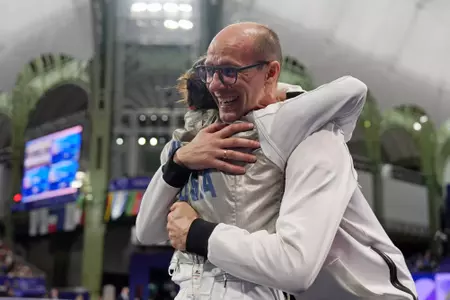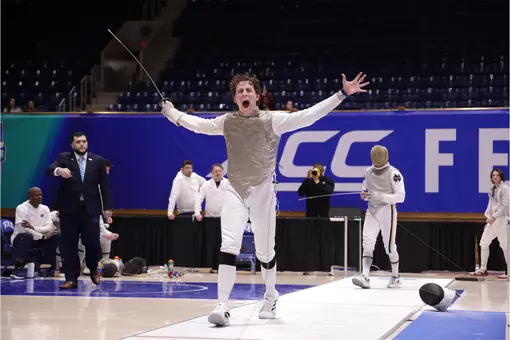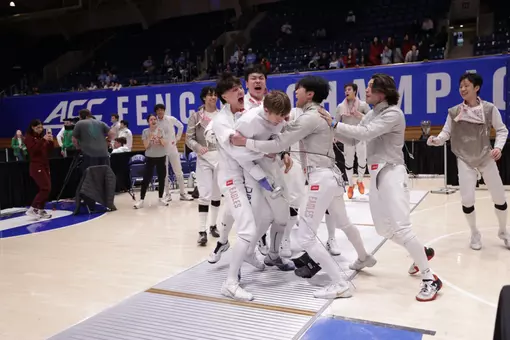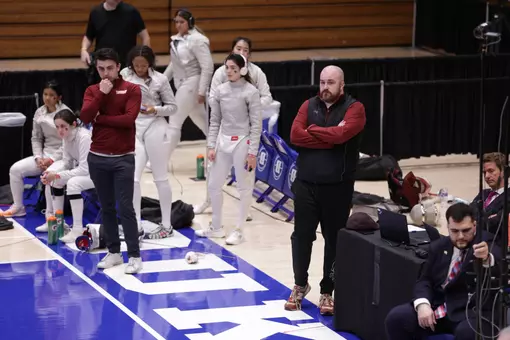Boston College Athletics

Photo by: Katie Goodale-USA TODAY Sports
Bissdorf Breaks History With USA Fencing
August 26, 2024 | Fencing, #ForBoston Files
The former silver medalist and current BC assistant coach led the United States to their first-ever team fencing gold medal.
CHESTNUT HILL, Mass. -- Lauren Scruggs' expression told a story etched into the eternal annals of Olympic lore.
The green light illuminating the score beyond the spotlit piste enveloped her wide eyes and gaping mouth in a deafening roar through fencing's decades-long history. She stood alone in shock, but the thousand-megawatt moment rang beyond her individual strike to Arianna Errigo's upper chest.
For the first time in the sport's history, the United States of America was going to stand atop the podium with a team-based gold medal, besting Italy. Off to the side, Scruggs' teammates fully understood the moment's magnitude. Italy were gold medalists in foil in 1992, 1996, 2000 and 2012 won separate bronze medals in 2008 and 2020, but they'd be forced to stand second and watch the Americans assume the top spot on the medal podium.
Ralf Bissdorf couldn't contain his excitement. He had left the 2000 games in Sydney, Australia as an Olympic medalist before traveling the world to spread the love and passion for his sport. He settled Massachusetts in 2016 and is now the assistant coach of the Boston College fencing program. At the moment the gold medal was secured, he allowed the emotions to flow as he, too, celebrated the star-spangled eruption at Paris' historic Grand Palais.
"Our team consisted of four incredible human beings and four incredible fencers," Bissdorf said after the conclusion of the Paris 2024 games. "I knew Jackie Dubrovich intended to retire after the Olympics, so watching her board the plane with her teammates with that medal around their neck, to welcome them to the club of Olympic medalists, was super rewarding. I cried several times in Paris, and I have cried in front of the television because when I see it again, I'm just so happy for the athletes. I know what it means to them. I know how hard they worked, and it was great to feel like a part of helping them fulfill their dreams."
Fencing is a sport measured in milliseconds. Athletes operate with databases of information stored within their brains, to which their feints and ripostes are determined by precision movements determined by an unmatched intensity. Their intelligence is often matched with a combination of creativity and intensity that's contrasted against an emotion bundled and released by the frequent starts and stops associated with matches and bouts.
Connections to the sport are deeply personal, but Bissdorf dedicated his life to pushing fencing to new heights. He clinched three straight World Cup championships while ascending to the No. 1 world ranking at the turn of the century, and his silver medal in 2000 restarted a tradition of excellence for a country hunting for its footing despite one of the most storied histories in the sport.
Germany had produced a medalist in every Olympics since the western world boycotted the 1980 games in the Soviet Union, but the gold medals in team epee and team foil for the reunified nation in 1992 failed to produce more than a single team bronze medal during the 1996 games. Countryman Wolfgang Wienand had been a semifinalist in foil during that Olympiad, but consecutive losses prevented him from an appearance on the medal stand in Atlanta.
Bissdorf's silver medal changed that trajectory. He emerged from a field that featured two returning semifinalists, including Wienand, to advance to the finals against Korea's Kim Young-Ho. Fellow German Rita Koenig likewise won silver in the women's event, and after competing in Athens in 2004, his legacy was solidified by Benjamin Kleibrink's gold medal in 2008.
"It's a multi-year process," he said. "It's not that you pop up and go to the Olympics. For me, after the 1996 Olympics, there was a four-year plan to get me the best odds to win a medal. The goal was to rank No. 1 in the world going into Sydney, but there was a master plan to try and gain the right amount of points and competitions. Then when I got to Sydney, I was ranked No. 1, so the chances increased. Those last one and a half years, everything halted. There was one goal. Everything went on hold."
The ascent through that mountain within the sport translated easily to his life after the piste, and Bissdorf later found his way to Massachusetts after spreading the sport through Singapore. He became the first head coach at the Singapore Sports School ahead of the nation's 2020 entry to Olympic fencing for the first time in 18 years before joining the Marx Fencing Academy in Concord, Massachusetts in 2016. In 2019, he joined head coach Brendan Doris-Pierce as the assistant coach of the Boston College program.
"I love a challenge," Bissdorf said, "and what it says about you is that this is a challenge to do what we want with Boston College. Before I came to the United States, I went to Singapore, and he drafted a plan to win a world championship medal. They had never been better than 57th in the world in any age category in any weapon, but we drafted a plan to win a world championship. Six years later, they had won a world championship medal."
Errigo and American Lee Kiefer very much occupied part of the fencing scene by those years, but this year completely upended the international order within foil. Two-time world champion Kiefer defeated Scruggs for the gold medal after Scruggs dispatched Arrigo in the quarterfinal round, and it came on the heels of Kiefer's 15-4 thrashing of Hungarian fencer Flora Paztor, who had previously eliminated Dubrovich.
They later teamed with Maia Weintraub to lead USA convincingly past China and Canada in the first two matches of the team event while Italy's world championship roster dominated Egypt and Japan in its first two rounds. Led by Kiefer and Scruggs, the Americans jumped past Errigo and Martina Favaretto to gain a five-touch lead before 2018 and 2023 individual foil world champion Alice Volpi scored a 7-5 advantage over both Dubrovich and Weintraub.
Kiefer and Weintraub responded by tilting the score back to a six-touch lead for the Americans, and a 5-1 win by Weintraub over Francesca Palumbo opened a nine-point commanding lead ahead of the last two rounds for Kiefer and Scruggs, who hit Volpi and Errigo, respectively, for five touches apiece and the final 10 points in the 45-39 win.
"What makes fencers unique is their individual style," Bissdorf said. "We have a decentralized system where the national team doesn't train together aside from training camps for the Olympic Games or the World Championships. There are a lot of international coaches and different clubs, and there are different approaches to fencing.
"The beauty of our team is that we had four different fencers with four different styles," he explained. "There wasn't one strategy that fit all of our opponents, so we custom-fit how we did things against different people."
The result was the first team-based gold medal in American fencing history and a new gilded outlook for Boston College fencing within the college fencing community. BC placed 16th in NCAA Championship competition a season ago after Levi Hughes claimed a bronze position in both the NCAA Northeast Regional and the ACC Championship. Both he and teammate Elijah Onik grabbed first team USFCA Northeast All-Region honors after the then-freshman finished second in men's foil with a subsequent top-10 finish in the NCAA Northeast Regional, and the duo combined with Luca Berman to move BC past Northwestern and within striking distance of both Brandeis and New York University for a top-15 slot nationally.
"There's a bit of a hierarchy in recruiting for college fencing," Bissdorf admitted. "There are schools that have more history in fencing than Boston College, but with Brendan Doris-Pierce as our head coach, there's a vision to make us more of a fencing college that people can consider for a high level. It's a process, but we are in that process. The level that you face at the NCAA Championships is crazy. There are Olympic medalists and future stars, so we have to push our boundaries as a program. It's been a few years, but our recruitment gets better every year. If you take a look at our rankings, people that decide to go to BC are higher ranked in the international polls. There is progress, but we just have to continue to progress with our quality."
The green light illuminating the score beyond the spotlit piste enveloped her wide eyes and gaping mouth in a deafening roar through fencing's decades-long history. She stood alone in shock, but the thousand-megawatt moment rang beyond her individual strike to Arianna Errigo's upper chest.
For the first time in the sport's history, the United States of America was going to stand atop the podium with a team-based gold medal, besting Italy. Off to the side, Scruggs' teammates fully understood the moment's magnitude. Italy were gold medalists in foil in 1992, 1996, 2000 and 2012 won separate bronze medals in 2008 and 2020, but they'd be forced to stand second and watch the Americans assume the top spot on the medal podium.
Ralf Bissdorf couldn't contain his excitement. He had left the 2000 games in Sydney, Australia as an Olympic medalist before traveling the world to spread the love and passion for his sport. He settled Massachusetts in 2016 and is now the assistant coach of the Boston College fencing program. At the moment the gold medal was secured, he allowed the emotions to flow as he, too, celebrated the star-spangled eruption at Paris' historic Grand Palais.
"Our team consisted of four incredible human beings and four incredible fencers," Bissdorf said after the conclusion of the Paris 2024 games. "I knew Jackie Dubrovich intended to retire after the Olympics, so watching her board the plane with her teammates with that medal around their neck, to welcome them to the club of Olympic medalists, was super rewarding. I cried several times in Paris, and I have cried in front of the television because when I see it again, I'm just so happy for the athletes. I know what it means to them. I know how hard they worked, and it was great to feel like a part of helping them fulfill their dreams."
Fencing is a sport measured in milliseconds. Athletes operate with databases of information stored within their brains, to which their feints and ripostes are determined by precision movements determined by an unmatched intensity. Their intelligence is often matched with a combination of creativity and intensity that's contrasted against an emotion bundled and released by the frequent starts and stops associated with matches and bouts.
Connections to the sport are deeply personal, but Bissdorf dedicated his life to pushing fencing to new heights. He clinched three straight World Cup championships while ascending to the No. 1 world ranking at the turn of the century, and his silver medal in 2000 restarted a tradition of excellence for a country hunting for its footing despite one of the most storied histories in the sport.
Germany had produced a medalist in every Olympics since the western world boycotted the 1980 games in the Soviet Union, but the gold medals in team epee and team foil for the reunified nation in 1992 failed to produce more than a single team bronze medal during the 1996 games. Countryman Wolfgang Wienand had been a semifinalist in foil during that Olympiad, but consecutive losses prevented him from an appearance on the medal stand in Atlanta.
Bissdorf's silver medal changed that trajectory. He emerged from a field that featured two returning semifinalists, including Wienand, to advance to the finals against Korea's Kim Young-Ho. Fellow German Rita Koenig likewise won silver in the women's event, and after competing in Athens in 2004, his legacy was solidified by Benjamin Kleibrink's gold medal in 2008.
"It's a multi-year process," he said. "It's not that you pop up and go to the Olympics. For me, after the 1996 Olympics, there was a four-year plan to get me the best odds to win a medal. The goal was to rank No. 1 in the world going into Sydney, but there was a master plan to try and gain the right amount of points and competitions. Then when I got to Sydney, I was ranked No. 1, so the chances increased. Those last one and a half years, everything halted. There was one goal. Everything went on hold."
The ascent through that mountain within the sport translated easily to his life after the piste, and Bissdorf later found his way to Massachusetts after spreading the sport through Singapore. He became the first head coach at the Singapore Sports School ahead of the nation's 2020 entry to Olympic fencing for the first time in 18 years before joining the Marx Fencing Academy in Concord, Massachusetts in 2016. In 2019, he joined head coach Brendan Doris-Pierce as the assistant coach of the Boston College program.
"I love a challenge," Bissdorf said, "and what it says about you is that this is a challenge to do what we want with Boston College. Before I came to the United States, I went to Singapore, and he drafted a plan to win a world championship medal. They had never been better than 57th in the world in any age category in any weapon, but we drafted a plan to win a world championship. Six years later, they had won a world championship medal."
Errigo and American Lee Kiefer very much occupied part of the fencing scene by those years, but this year completely upended the international order within foil. Two-time world champion Kiefer defeated Scruggs for the gold medal after Scruggs dispatched Arrigo in the quarterfinal round, and it came on the heels of Kiefer's 15-4 thrashing of Hungarian fencer Flora Paztor, who had previously eliminated Dubrovich.
They later teamed with Maia Weintraub to lead USA convincingly past China and Canada in the first two matches of the team event while Italy's world championship roster dominated Egypt and Japan in its first two rounds. Led by Kiefer and Scruggs, the Americans jumped past Errigo and Martina Favaretto to gain a five-touch lead before 2018 and 2023 individual foil world champion Alice Volpi scored a 7-5 advantage over both Dubrovich and Weintraub.
Kiefer and Weintraub responded by tilting the score back to a six-touch lead for the Americans, and a 5-1 win by Weintraub over Francesca Palumbo opened a nine-point commanding lead ahead of the last two rounds for Kiefer and Scruggs, who hit Volpi and Errigo, respectively, for five touches apiece and the final 10 points in the 45-39 win.
"What makes fencers unique is their individual style," Bissdorf said. "We have a decentralized system where the national team doesn't train together aside from training camps for the Olympic Games or the World Championships. There are a lot of international coaches and different clubs, and there are different approaches to fencing.
"The beauty of our team is that we had four different fencers with four different styles," he explained. "There wasn't one strategy that fit all of our opponents, so we custom-fit how we did things against different people."
The result was the first team-based gold medal in American fencing history and a new gilded outlook for Boston College fencing within the college fencing community. BC placed 16th in NCAA Championship competition a season ago after Levi Hughes claimed a bronze position in both the NCAA Northeast Regional and the ACC Championship. Both he and teammate Elijah Onik grabbed first team USFCA Northeast All-Region honors after the then-freshman finished second in men's foil with a subsequent top-10 finish in the NCAA Northeast Regional, and the duo combined with Luca Berman to move BC past Northwestern and within striking distance of both Brandeis and New York University for a top-15 slot nationally.
"There's a bit of a hierarchy in recruiting for college fencing," Bissdorf admitted. "There are schools that have more history in fencing than Boston College, but with Brendan Doris-Pierce as our head coach, there's a vision to make us more of a fencing college that people can consider for a high level. It's a process, but we are in that process. The level that you face at the NCAA Championships is crazy. There are Olympic medalists and future stars, so we have to push our boundaries as a program. It's been a few years, but our recruitment gets better every year. If you take a look at our rankings, people that decide to go to BC are higher ranked in the international polls. There is progress, but we just have to continue to progress with our quality."
Players Mentioned
Men's Basketball: Virginia Tech Postgame Press Conference
Wednesday, March 04
Boden Kapke: Career High 25 Points
Wednesday, March 04
Eagles Spotlight: Kara Goulding
Tuesday, March 03
Softball Recap: 10-2 vs UNC
Monday, March 02





















